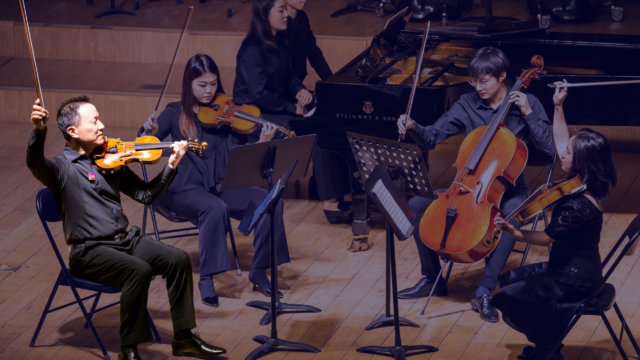New Funds for PPP and SBA Loans, Halt on Immigration, Arts Ed and Teaching Artistry Amid COVID-19, and NEA Awards Funds to States
April 24, 2020
Congress Acts on New Funds for PPP and SBA Loans
Congress and the White House are taking final action on a narrowly-tailored “interim” COVID-19 relief bill. The deal adds funding to the existing Paycheck Protection Program administered by local lenders and the Economic Injury Disaster Relief program administered by the Small Business Administration, and provides additional resources for COVID-19 testing and hospitals. Congress is expected to take up a separate package of new and expanded COVID-19 relief measures in the weeks to come, and ongoing advocacy will be essential.
Here is a quick overview of the Paycheck Protection and Health Care Enhancement Act:
- Paycheck Protection Program:
$310 billion in new funding (with $60 billion of that amount set aside to be administered by smaller lending institutions like credit unions and community financial institutions).
- SBA Economic Injury Disaster Relief:
$50 billion in new funding for the Economic Injury Disaster Loan (EIDL) Program
$10 billion in new funding for the EIDL Grants
In the interest of speedy passage of this bill, negotiators chose not to make substantial changes to the eligibility for the relief programs, which means requests by nonprofit advocates (PDF) for a dedicated pool of resources and for Congress to lift the 500-employee cap are not included in this measure. The bill has been approved by the Senate and House, and the White House has signaled its support.
While there is not a clear answer as to how soon lenders will be able to administer the new funds, policy leaders say the resources will be “rapidly” available to lenders.
The League’s COVID-19 Federal Assistance Resource page provides more information about these and additional forms of relief.
Executive Order Halts Immigration, Calls for Review of Nonimmigrant Programs
An executive order issuing a Proclamation Suspending Entry of Immigrants was signed by President Trump on April 23, barring the issuance of new green card status for many individuals for a 60-day period. This group of people intending to immigrate to the U.S. who would be affected by the ban could include artists seeking permanent residency. Note that the executive order does not yet limit the nonimmigrant O and P visas in use by guest artists.
While the proclamation is set to expire in 60 days, the President has indicated he would review the executive order to determine if it should be renewed. Additionally, the proclamation states that within 30 days of the effective date, the Secretaries of Labor and Homeland Security will review nonimmigrant programs and recommend further action, which means changes to O and P artist visas could come under consideration.
The League of American Orchestras stands by our firm belief in the power of music to communicate across differences, express and animate the issues of our time, and advance international diplomacy and our democracy. While live concert performances are curtailed in the wake of COVID-19, U.S. visa and immigration policy must still support ongoing plans for future global arts activity.
The League has joined dozens of national organizations seeking policy action to support artist visas (PDF) amid the COVID-19 crisis, offers technical assistance to orchestras who are mid-stream in the visa process and planning for future artistic partnerships, and hosts the definitive resource on navigating the U.S. visa process, www.artistsfromabroad.org, where you can find the latest news.
Arts Education and Teaching Artistry Amid the COVID-19 Crisis
Federal emergency funding provided in the CARES Act is now available to states through block grants and emergency relief resources intended to support the new costs of adapting to learning needs amid the COVID-19 crisis. Funds are primarily targeted to Title I schools, and state and local education policy leaders are given opportunities to choose how to direct these COVID-19 relief resources. As orchestras continue to partner with schools to support music education in new ways, it is critical to speak up in support of arts learning opportunities and to also take stock of the essential skills of teaching artists that orchestras partner with to address learning and youth development opportunities for student populations. The League serves on the advisory committee of the Arts Education Partnership, which is hosting a collection of resources related to arts education and COVID-19.
NEA Awards CARES Act Funding to States
As of last week, the National Endowment for the Arts (NEA) announced it awarded almost $30 million to the nation’s 50 states, the District of Columbia and several territories including Puerto Rico, for re-granting in order to preserve jobs and facilities costs. The agency is mandated by Congress to allocate 40 percent of its funding, including the $75 million CARES Act allocation, to state and territorial arts agencies and regional arts organizations for their funding programs. Less than three weeks after the CARES Act was signed into law, the NEA has worked rapidly to deliver this 40 percent to states and is now accepting and evaluating applications for direct grants to arts organizations.
Each state, territorial, and regional arts agency is developing its own process for awarding CARES Act funds, so prospective applicants should visit the states and regionals page on the Arts Endowment’s website for more information.
Related
-
News | Advocacy
House Defeats Brecheen Amendments, Senate Acts Next
-
News | Advocacy
House Amendment Would Reduce NEA Funding by 25%
-
Learn | Advocacy
Conference 2024: Global is Local: The New Music Diplomacy
Become a member
Thank you for your interest in the League of American Orchestras! We are dedicated to advancing the orchestral experience for all.
Join Now
